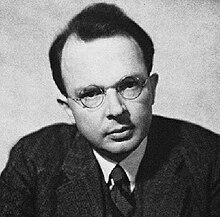
Back Rudolf Carnap AF رودولف كارناب Arabic رودولف كارناب ARZ رودلف کارناپ AZB Рудольф Карнап BE Рудолф Карнап Bulgarian রুডলফ কারনাপ Bengali/Bangla Rudolf Carnap Catalan ڕودۆلف کارناپ CKB Rudolf Carnap Czech
Rudolf Carnap (/ˈkɑːrnæp/;[20] German: [ˈkaʁnaːp]; 18 May 1891 – 14 September 1970) was a German-language philosopher who was active in Europe before 1935 and in the United States thereafter. He was a major member of the Vienna Circle and an advocate of logical positivism.
- ^ "Review of Gonzalo Rodriguez-Pereyra, Resemblance Nominalism: A Solution to the Problem of Universals" – ndpr.nd.edu
- ^ Carnap, R. (1934), "On the Character of Philosophic Problems (Über den Charakter der philosophischen Probleme)," translation by W. M. Malisoff, Philosophy of Science, 1, pp. 5–19.
- ^ a b Zalta, Edward N. (ed.). "Behaviorism". Stanford Encyclopedia of Philosophy.
- ^ a b c A. W. Carus, Michael Friedman, Wolfgang Kienzler, Alan Richardson, Sven Schlotter (eds.), Rudolf Carnap: Early Writings: The Collected Works of Rudolf Carnap, Volume 1, Oxford University Press, 2019, pp. xiii–xiv.
- ^ a b c Cite error: The named reference
SEPwas invoked but never defined (see the help page). - ^ Physicalism (Stanford Encyclopedia of Philosophy)
- ^ Arthur Sullivan, The Constitutive A Priori: Developing and Extending an Epistemological Framework, Lexington Books, 2018, p. 106.
- ^ Rudolf Carnap, The Logical Syntax of Language, Routledge & Kegan Paul, 1937, pp. 13–14.
- ^ A. W. Carus, Carnap and Twentieth-Century Thought: Explication as Enlightenment, Cambridge University Press, 2007, p. 222.
- ^ A. W. Carus, Carnap and Twentieth-Century Thought: Explication as Enlightenment, Cambridge University Press, 2007, pp. 223 and 227.
- ^ Thomas Uebel, Empiricism at the Crossroads: The Vienna Circle's Protocol-Sentence Debate Revisited, Open Court, 2015, p. 142.
- ^ Steve Awodey pronounces Carnap's Gabelbarkeitssatz-related pursuits "ill-fated" (Steve Awodey, "Structuralism, Invariance, and Univalence" (March 4, 2014)).
- ^ "Structural Realism": entry by James Ladyman in the Stanford Encyclopedia of Philosophy
- ^ a b c Carnap, Rudolf – Internet Encyclopedia of Philosophy
- ^ Rudolf Carnap, "Überwindung der Metaphysik durch logische Analyse der Sprache", Erkenntnis II (1932): 219–241.
- ^ Dutilh Novaes, Catarina; Reck, Erich (2017). "Carnapian explication, formalisms as cognitive tools, and the paradox of adequate formalization". Synthese. 194: 195–215. doi:10.1007/s11229-015-0816-z.
- ^ Richardson, Alan; Isaacson, Dan (1994). "Carnap's Principle of Tolerance". Proceedings of the Aristotelian Society, Supplementary Volumes. 68: 67–83. doi:10.1093/aristoteliansupp/68.1.67. JSTOR 4107023.
- ^ Rudolf Carnap (1966), An Introduction to the Philosophy of Science, Basic Books, p. 220.
- ^ C. James Goodwin (2009). Research In Psychology: Methods and Design (6th ed.). Wiley. p. 11. ISBN 978-0-470-52278-3.
- ^ "Carnap". Random House Webster's Unabridged Dictionary.
